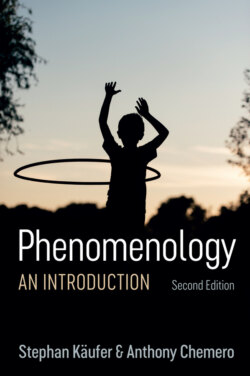Читать книгу Phenomenology - Anthony Chemero - Страница 16
1.4 Kantian themes in phenomenology
ОглавлениеKant’s influence on the development of philosophy and psychology throughout the nineteenth and early twentieth century is enormous, and this sketch only scratches the surface of the main ideas from his critical philosophy. But it suffices to highlight several key aspects in which phenomenology from Husserl to Merleau-Ponty is a Kantian enterprise: the idea of constitution, the temporal structure of synthesis, and the idea of subject–object identity.
The first of these is the idea that subjective structures somehow constitute the objects of experience. In most of his writings, especially early on, Husserl takes his work to be concerned with spelling out constitutive structures of experience. He maintains much of Kant’s cognitivist approach, that is, the idea that the constitutive structures derive from the mental processes that make up conscious experience. But he thinks that these structures are more prevalent and varied than Kant’s comparatively austere list of twelve categories. In some of his later work, Husserl develops other approaches in his phenomenology that are closer to the views of Heidegger and Merleau-Ponty.
Both Heidegger and Merleau-Ponty sharply reject the cognitivism of Kant’s philosophy. They do not think that the basic structures that enable us to experience an objective world are conceptual, or even primarily mental. They do not think of object-constitution in Kantian or Husserlian terms. Nevertheless they, too, argue that a hidden, pre-personal structure makes experience possible and that it is the job of philosophy to uncover and describe this structure. Rather than concepts, they argue that pre-personal conditions of intelligibility consist of our bodily habits and skills, developed and deployed in a specific cultural setting.
Kant’s analysis of the threefold synthesis has a direct impact on the work of both Husserl and Heidegger. It is the basis for Husserl’s theory of time consciousness. Inspired by his mentor Franz Brentano (who, in turn, is influenced by Kant), Husserl develops an account according to which we are always conscious of temporally thick objects. A present intention is always coupled with conscious retention of the immediate past and a forward-looking “protention.” We discuss this account in Chapter 3. Like Kant, Husserl also uses his analysis of the temporal structure of consciousness to give an account of the nature of the conscious self, analogous to Kant’s analysis of apperception.
Heidegger writes and lectures extensively on Kant’s analysis of the threefold synthesis (Heidegger 1927/1928, 1929). Since Heidegger rejects Kant’s cognitivism, though, his interpretation forces a substantial transformation onto Kant’s core insight. The synthesis, for Heidegger, is not an activity of the mind in which it brings distinct conscious representations together. Instead it is a pre-cognitive unifying activity of the whole person, in which your purposive abilities reveal things as already mattering and inviting you to act. Like Kant, Heidegger locates the structure of the self in this unifying structure, and like Husserl he thinks the structure is fundamentally temporal. But both the notion of time and the notion of the self undergo a deep transformation. We discuss Heidegger’s account of temporality and the self in Chapter 4.
A final theme from Kant that becomes a fundamental tenet of phenomenology is the idea of subject–object identity. As we saw, Kant argues in the deduction – and more explicitly in the refutation of idealism – that the cognizing subject can only exist as such in relation to some object. This becomes one of the dominant themes in German idealism. In this movement the generation of philosophers after Kant, led by Reinhold, Fichte, Schelling, and Hegel, sets to work on adapting and changing Kant’s critical philosophy in order to overcome some of the tensions they perceive in it. In particular, they think that a more detailed account of the identity of the knowing subject and its object can obviate the need for the awkward and unpopular aspect of transcendental idealism that claims that we cannot know objects as they are in themselves. The basic idea is that any perceived limitation on our ability to know things as they are in themselves is due to an incomplete understanding of ourselves as knowing subjects. Hegel drives this thought to its full logical conclusion in his Phenomenology of Spirit, in which he argues that we achieve absolute knowledge of the world of objects at the same time, and by virtue of the same conceptual transformation, as we achieve complete self-consciousness.
Hegel’s system is a breathtaking and daring revision of Kant’s critical philosophy. But Hegel still maintains Kant’s overall focus on consciousness. Absolute knowing, for Hegel, is the province of a conscious, conceptually mediated relation to objects. Even though he recognizes the crucial role of desire, the body, physical work, and the fear of death as constitutive processes in a gradual, historical process of achieving self-consciousness, their contribution to his analysis is always conceptual. Heidegger and Merleau-Ponty, on the other hand, think that the essential connection between subject and object consists of non-conceptual interaction. The subject, they argue, only exists and can only find itself “out there” among the entities it is at grips with in the course of pursuing some purposive way of being.
